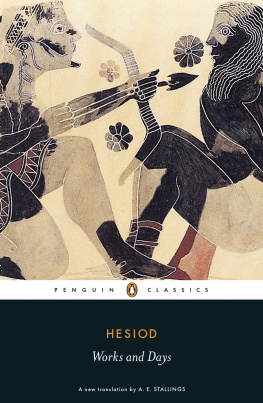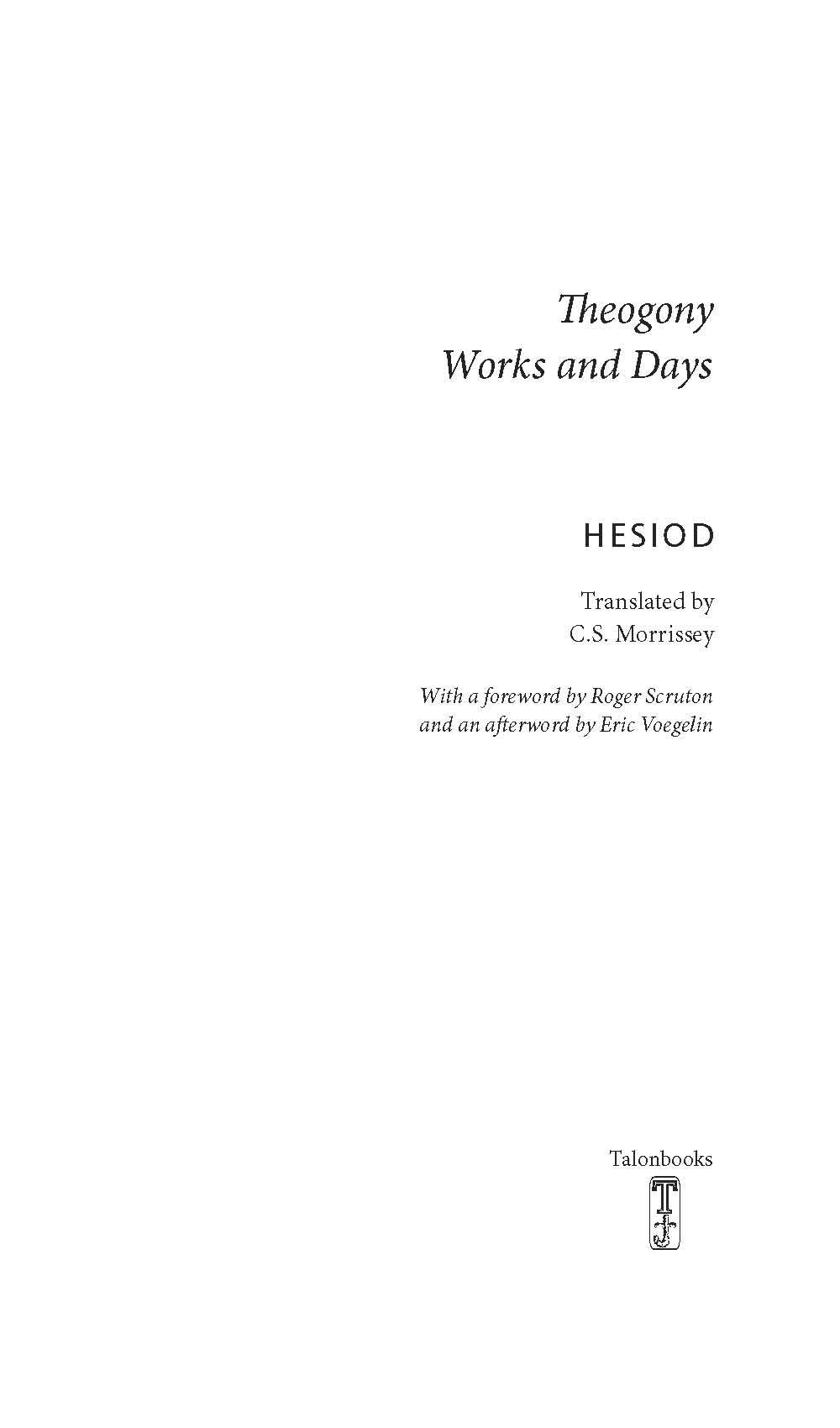To translate a foundational text is to expose yourself, your world, and your historical moment to an undying vision.
Of Hesiod is this especially true. He looks down on us with the eyes of his gods, prising open our secrets, showing the flawed contours of the human soul without the social and cultural embellishments that have enabled us to hide them. There is, in his verses, a divine simplicity that carries complete conviction. And, when we recognize ourselves in his accounts of the rugged life that he knew, we acknowledge that we too need the nomos; we too depend upon custom and upon the natural and eternal justice without which we cannot live in peace with our neighbors or build a world that we share. C.S. Morrissey places a very modern sensibility under the light of these precious verses, and his translations remind us at every point that Hesiods gods are still with us, not as subjects to be worshipped and appeased through sacrifice, but as enduring motives that govern and disrupt our lives.
Translators Note
This translation aims to present Hesiods poetry as engaging storytelling, unmediated by distracting footnotes and scholarly nitpicking. The Greek is translated accurately, if at times expansively nevertheless, every expansive interpretation is rooted in the Greek text. In my original manuscript, each line of Greek source text corresponded directly to a single line in English translation. Any expansions in the English never went more than one line beyond where they originated in correspondence to the Greek. On rare occasions, words from one line appeared in the immediately previous or immediately following line, if it was necessary in order to achieve more natural English syntax within the sentence. Reformatted for publication, the one-to-one line correspondence in my original manuscript has been broken up so that the translation of each Greek line is now spread over two (and usually only two) lines of English.
This format allows for plenty of white space on the page and is intended to provide a more pleasant experience for the reader. Words not found in the Greek text have sometimes been added to the translation as explanatory information for English readers unfamiliar with Greek mythology. The inclusion of this information thereby saves these readers from the drudgery of referring to footnotes. The rule I have followed in this regard is that explanatory additions to the text do not exceed the length of the one English line to which they are inserted when expanding upon the thought in the one Greek line. Information that Hesiod assumed his Greek listener already knew has occasionally been added, without scruple, to this translation. Again, this is done for the ease and pleasure thereby granted the reader.
Because it is often cumbersome to refer back and forth to a glossary, both English and Greek versions of names are frequently given side by side in the text for the readers translators note convenience. When I felt it appropriate to do so, I have flagged the appearance of a significant divinitys or individuals name with italics. Think of it as an increase in brightness as someone enters briefly into the spotlight. Transliterated Greek words are also set in italics. I use a mix of Greek and Roman spellings in English translation for aesthetic reasons. Often the familiar Roman version of a name seemed best for a reader.
The chapter divisions, titles, and subheadings are all additions of my own invention. They aim to make the storytelling as accessible as possible. They also highlight some hitherto unnoticed parallel symmetries constructed around the central Prometheus episode of Theogony, Chapter 5. For example, the careful reader will see the parallels between Chapters 4 and 6, between Chapters 3 and 7, between Chapters 2 and 8, and between Chapters 1 and 9. It is confidently assumed that Hesiod would approve of these chapter divisions, especially since, nine in number, they honor the Muses. I have consulted the texts of West (1966, 1978), the translations of Lattimore (1959), Frazer (1983), Athanassakis (1983), Caldwell (1987), Grene (1998), and the Loeb editions of Evelyn-White (1914) and Most (2006).
But any scholarly disputes that the translation simply settles without comment, and any innovative interpretations of Hesiods story that shine forth in this translations modern storytelling, are unapologetically offered here to the reader as the humble obedience of the translator to the Muses divine instruction. Still, blame me for any clunkers, and never them. I have chosen to render the important Greek word thumos as competitive spirit (instead of either anger or spirit). This may seem like I am giving Hesiod lessons in the anthropology of Ren Girard, but the insights gained by this simple maneuver, which unlock a key theme in Hesiods poetry, are worth the price of any knee-jerk skeptical jeers. This translation choice also allows the Theogony to sound out themes taken up more explicitly in the Works. It thus highlights the frequently unappreciated unity of Hesiods speculative reflections about human experience.








